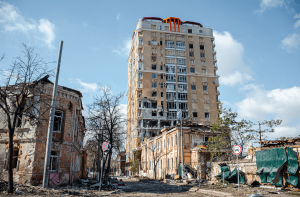Overall damage to the housing sector alone following the Russian invasion of Ukraine is estimated at over US$50 billion. In Kharkiv, Ukraine’s second largest city, some 3367 apartment buildings and 1823 single apartment buildings have been destroyed and damaged, according to the City Council. The city’s infrastructure has also been severely damaged. In the Southern city of Mykolaiv, damage is estimated to affect over 650,000 square metres, with housing stock accounting for 77% of overall damage, according to a One Works assessment; while the Kyiv school of Economics has estimated overall damage to Mykolaiv’s infrastructure at over €852m.
To support the local and national governments for the reconstruction of Kharkiv and Mykolaiv, the United Nations Economic Commission for Europe (UNECE) is embarking on a new phase in its assistance for the preparation and implementation of urban development Master Plans that place sustainability, resilience and inclusion at the heart of the process.
Since April 2022, at the request of the Ministry of Development of Communities, Territories and Infrastructure, UNECE has been implementing two pilot projects in Kharkiv and Mykolaiv. The UN4Kharkiv and UN4Mykolaiv Task Forces, coordinated by UNECE and bringing together 16 UN entities and international organisations, have so far supported the work of international and Ukrainian architects, engineers and other experts in the development of draft reconstruction Master Plans for the two cities.
Scaled-up under the broader UN4UkrainianCities initiative, the support to be rolled out between June 2023 and the end of 2024 will take this work forward with a view to “operationalize” the reconstruction efforts after the end of the war and to facilitate investment in sustainable urban infrastructure. This will be supported by USD 5 million funding by the German Federal Ministry for Economic Cooperation and Development (BMZ) and supported by the Deutsche Gesellschaft für Internationale Zusammenarbeit (GIZ) GmbH. These efforts will help the cities to “build back better” following a balanced, evidence-based, participatory approach that links emergency and long-term strategic objectives.
“The revival of the city is ongoing every day – we need not wait until the end of the war. The master planning should be the priority as we will have the clear vision of the city after the war. We are actively working today on the planning and on the city reconstruction”, stated Olga Demianenko, Director of Department for cooperation with International Agencies and Financial Institutions of the city of Kharkiv.
“The main idea of this project is to create a master plan that won’t be just architectural documentation, but a plan of the development of the city”, stressed Oleksandr Syenkevych, Mayor of Mykolaiv. “We speak about different spheres, we speak about public zones, about industrial and tech zones, and about the green transition – heating, water supply and everything. And it’s about economy, because we want to rebuild a city for business, we want to create new centres for citizens, to make them think about how to come back as soon as possible, and how they will develop their families and raise their children”.
The project will comprise five components:
- Support to revisions of the national policy framework for the integrated urban planning; and development of an online platform containing a Toolbox for reconstruction of Ukrainian cities
- Economic and social assessment: impact survey-based assessment of the socio-economic impact of the war on Kharkiv and Mykolaiv
- Formulation of pilot projects and identification of investors: Support to the implementation of reconstruction master plans for Kharkiv and Mykolaiv
- Capacity building and public involvement in planning rebuilding of the cities
- Monitoring of implementation and investments: development of an investment tracker.
The Master Plan for the city of Kharkiv is being developed on a pro-bono basis by the Norman Foster Foundation, together with a group of local architects and urban planners, as well as with an Advisory Board of international experts. Similarly, the development of the Master Plan for the city of Mykolaiv is being led by global design and architectural company One Works on a pro bono basis, together with its international experts.
Local groups of architects and experts have been formed in both cities in order to co-create the Master Plan together with the team of international architects and experts. The involvement of civil society is an essential part of the planning processes and to increase the understanding of and engagement with the activities in the cities. As part of an inclusive process, Kharkiv’s and Mykolaiv’s citizens have a relevant say and are empowered to shape their neighbourhood’s and city’s future; visions for the Master Plans for Kharkiv and Mykolaiv build on surveys involving 18,000 and 8,000 local people in the respective cities. The development process aims to be transparent and inclusive, taking into account a wide range of perspectives from the local population.
The project will coordinate activities with international partners including international architects, the GIZ, the European Commission, EU Committee of Regions, cities networks, and more.
Note to editors
The Norman Foster Foundation based in Madrid, Spain, hosts the UNECE Geneva UN Charter Centre of Excellence on Sustainable Housing. One Works is a partner of the LIUC Business School in Castellanza, Italy, which hosts the UNECE Geneva UN Charter Centre of Excellence on Sustainable Finance for Cities and Infrastructure. For more information on the Centres of Excellence, please visit https://unece.org/housing/charter-centres
Photo credit: City of Kharkiv
